The White House will shift more than $500 million away from the Ebola fight in West Africa to combat the Zika virus that’s been linked to serious birth defects, tacitly caving to GOP demands Wednesday, though officials still want nearly $2 billion from Congress to combat the mosquito-borne illness.
Cabinet officials said their transfer of $510 million from Ebola and $79 million from other accounts will prop up research into a better diagnostic test and vaccine for Zika and bolster efforts to eradicate the pesky mosquito that ferries the virus.
Top Republicans had pressed for the shift in funds for months, rejecting the administration’s pleas for new money and saying the Ebola account could be tapped.
But the White House insisted the quick infusion isn’t enough, and says Mr. Obama will still insist on an additional $1.9 billion to replenish the Ebola money and expand Zika efforts even more.
“Without the full amount of requested emergency supplemental funding, many activities that need to start right now would have to be delayed or curtailed or stopped within months,” said Shaun Donovan, director of the White House Office of Management and Budget.
Zika has been linked to a surge in the number of babies born with abnormally small heads, a condition known as microcephaly, in Brazil and other Latin American countries. It’s also been tied to Guillain-Barre syndrome, which can cause paralysis.
SEE ALSO: DEA to decide within months whether to change federal status of marijuana
The virus has also been detected in Puerto Rico and some sexually transmitted cases have been recorded in the U.S., and it could puncture deeper into the mainland in coming months.
But the administration’s request faces a tough time on Capitol Hill, where GOP leaders are already struggling to pass a fiscal 2017 budget amid a conservative rebellion over higher spending levels. Additional Zika money could inflame that fight.
House Committee on Appropriations Chairman Harold Rogers says the administration hasn’t spent about $2.7 billion of the $5.3 billion set aside to deal with the Ebola outbreak, and that Congress could backfill the use of those funds during the fiscal 2017 appropriations process.
On Wednesday he praised the White House’s move.
“These resources — which the agencies already have on hand — will help stop the growth of this devastating disease around the world, and prepare for and protect against outbreaks within our borders,” the Kentucky Republican said.
The administration had long said it might repurpose some of its Ebola funding on top of its supplemental request, though on Wednesday it said that amount should not be debited from the pending request.
SEE ALSO: Obamacare customers are sicker and costlier than pre-2014 folks: insurer study
“I want to be very clear that our $1.9 billion request remains our $1.9 billion request,” Mr. Donovan said, arguing Congress should not force them to choose between fighting Zika and fighting Ebola.
The administration has said it wants to totally stamp out Ebola, which has killed more than 11,000 people in Liberia, Sierra Leone and Guinea since December 2013.
Officials pointed to a cluster of flare-ups in Guinea and the Ebola-related death of a 30-year-old woman in Liberia last week, just days after the World Health Organization said the outbreak was no longer a public health emergency of international concern.
House Majority Leader Kevin McCarthy said the WHO’s declaration means Ebola is winding down, so it is time to redirect those funds to Zika.
“By doing this, we can protect against outbreaks without burdening the taxpayers further,” the California Republican said.
Though Zika isn’t spreading by mosquitoes in the continental U.S., the Centers for Disease Control and Prevention has recorded 312 travel-related cases in the 50 states and D.C., including 27 cases in pregnant women.
U.S. territories have reported 349 cases of locally acquired infection, mostly in Puerto Rico.
Health and Human Services Secretary Sylvia Mathews Burwell said a baby born with microcephaly in Hawaii tested positive for Zika, and states like Texas and Florida will be on the front lines of local transmission this summer. As temperatures climb, the climate becomes more hospitable to the Aedes aegypti mosquito that carries the virus.
White House press secretary Josh Earnest said Republicans in affected states will regret not falling in line behind Mr. Obama’s request.
“I guess at some point,” he said, “they’re going to have to choose whether or not their animosity toward President Obama trumps their desire to try to protect pregnant women in their states from this terrible disease.”
• Tom Howell Jr. can be reached at thowell@washingtontimes.com.




Please read our comment policy before commenting.